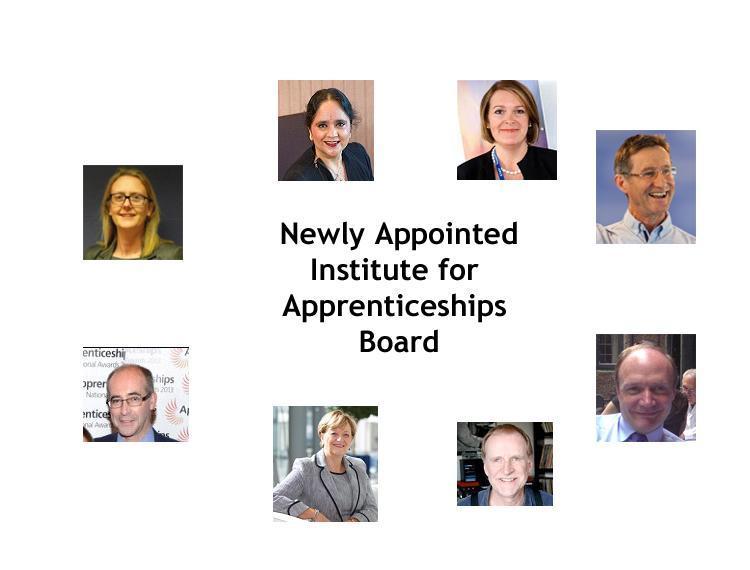The Institute for Apprenticeships board members are announced. But what is missing?

The eight new members of the Institute for Apprenticeships board have been announced:
Dr Katherine Barclay
Sir Gerry Berragan
Bev Robinson
Paul Cadman Dame
Fiona Kendrick
Dame Asha Khemka
Robin Millar CBE
Toby Peyton-Jones
– The eight board members are made up entirely of leaders from the worlds of business and education
– Despite 75% of Apprenticeships being delivered by Independent providers, no training providers are represented on the board
One of the Institute for Apprenticeships main jobs when it starts operating in April 2017 will be to support the government’s drive to deliver three million quality apprenticeships by 2020 and that businesses get the skilled workforce they need to prosper, so it was seen to be vital that employers were well represented. That is why the board will be made up primarily of employers, business leaders and their representatives.
Apprenticeships and Skills Minister Robert Halfon said about the appointments:
“It is fantastic to see such a diverse board who will bring their varied and high level experience to the Institute for Apprenticeships to ensure apprenticeships are of the highest quality they can be.
“With employer expertise at its heart, the Institute for Apprenticeships will play a crucial role in raising the prestige of apprenticeships and ensuring employers can get the skilled workforce they desperately need.”
The operational plan, published for consultation, will set out how the Institute will take the lead on a number of ongoing reforms to improve the apprenticeship system. It details how the Institute will provide advice to the government on funding and ensure employers get the quality skills that they need from the apprenticeship system.
Following consultation, the plan will set out how the Institute for Apprenticeships will deliver its functions to:
- Improve the quality of apprenticeships
- Regulate the quality of apprenticeship standards and assessment plans
- Provide advice to Government on the pricing of apprenticeship standards
- Establish how the Institute will collaborate with partners to drive quality across the apprenticeships system
- Gain more information and insight on how we will lead the reforms to technical education
Shadow Chair for the Institute for Apprenticeships Antony Jenkins said:
“I believe this is an excellent, high-calibre board that will help the Institute drive up the quality of apprenticeships. Today’s publication of the draft operational plan is the culmination of lots of hard work and engagement over the last six months and I am very grateful to all the stakeholders who have helped us prepare it.”
“The introduction of an apprenticeship levy from April 2017 represents the biggest set of changes to apprenticeship funding since the re-introduction of modern apprenticeships in the mid-1990s”.
Sector Response:
Mark Dawe, Chief Executive of the Association of Employment and Learning Providers (AELP) comments on the board appointments:
“As independent training providers deliver over three-quarters of apprenticeships in England, it is extremely disappointing that the independent sector isn’t represented. Time and time again throughout this four year process of reform, it is independent providers in partnership with thousands of employer customers of all sizes who have steered the policymakers back towards workable solutions that support the overarching reform principles. The debates in Parliament on the Technical and Further Education Bill, which will give the Institute its powers, have shown that there are several potential minefields to negotiate before we can call the reforms a success. Therefore we would urge the government to expand the board’s membership at the earliest opportunity to secure the required expertise from the independent provider sector.”
Lindsay McCurdy, Chief Executive of Apprenticeships4England:
“A very strong board, but what is MISSING?.. The voice and representation of the Independent Training Provider, who deliver over three quarters of all Apprenticeship delivery and are a central to the Government to meet it’s target of 3m quality apprenticeships by 2020. What is not always recognised is that 40% of Apprenticeships delivered by further education colleges is subcontracted out to Independent Training Providers which to some extent hides the true contribution being made by Independent Training Providers.
Therefore, if the government wants the IFA to be a true representation of the apprenticeships sector this has to be addressed asap. The board must involve employers, colleges and universities, but if you want to understand how to make an apprenticeship programme work and how to respond to employers and learners needs, then representation from Independent Training Providers has to be included on the Board”.
Commenting on the announcement of the Institute for Apprenticeships board members being appointed, David Hughes, Chief Executive of the Association of Colleges (AoC), said:
“This is a strong list of Board appointments for the new Institute for Apprenticeships (IfA), which will be an important and influential body. We are particularly pleased that two leading college principals, Dame Asha Khemka and Bev Robinson, have been selected. They will bring enormous experience and insight into the needs of employers, communities and apprentices, as well as the passion and dedication to help make the IfA a success.
“The appointment of two further education college principals shows that the Government recognises the critical role that colleges play in every community. They are a crucial part of the education system, as well as contributors to economic growth, delivering the Government’s Industrial Strategy and as drivers of social mobility.”
So who are the new Institute for Apprenticeships Board members:
 Dr Katherine Barclay
Dr Katherine Barclay
- Chair of the Life Science and Industrial Sciences Apprenticeship Trailblazer
- Currently Pfizer UK lead for academic liaison, with responsibility for delivering apprenticeship reform at a national science industry level and collaborative early talent management strategies at undergraduate, graduate and postgraduate level
- A Chartered Chemical Engineer and experienced people manager

Sir Gerry Berragan
- Was a career soldier for 37 years finishing as Adjutant General, responsible for all Army personnel matters
- Was the Army’s Apprentices Ambassador in 2008 to lead the effort to make the Army the largest apprenticeships provider in the country, offering more than 45 nationally-recognized training schemes
 Bev Robinson
Bev Robinson
- Has over 20 years’ experience in further and higher education colleges
- Sits on the Lancashire LEP Skills and Employment Board and is non-executive director and chair of the Blackpool, Fylde and Wyre Economic Development Company
- Director of the National College for Onshore Oil and Gas
- Principal of Blackpool and the Fylde College and previously member of Lord Sainsbury’s panel on Technical Education
 Paul Cadman
Paul Cadman
- HR Director for Walter Smith Fine Foods Limited since 1998
- Walter Smith Fine Foods Limited were chosen as Medium Employer of the Year winner in recognition of their commitment to developing local young people through apprenticeships in the National Apprenticeship Awards ceremony in 2013
- Has been one of the Government’s Apprentice Ambassadors since 2012 and is chair of two Trailblazer groups: developing butchery apprenticeship standards and Learning & Development standards
 Dame Fiona Kendrick
Dame Fiona Kendrick
- Chair and CEO of Nestle UK and Ireland since 2012
- She has a passion for the youth employment and skills agenda, and is leading a number of lighthouse projects in this area both inside and outside Nestle
- The Nestle Academy brings together graduate and apprenticeship programmes, direct entry schemes and vocational training in order to deliver more flexible entry points and alternative routes to higher education for people
- Was UK Commissioner for Employment and Skills and played a lead role in supporting the development and delivery of strategies for skills and employment across the four UK nations
- Was President of the Food and Drink Federation from January 2015 to December 2016. She previously led the organisation’s skills and competitiveness agenda and co-chaired the UK Food and Drink Export Forum
- In the 2015 New Year’s Honour’s list Fiona was created Dame Commander of the British Empire for services to the food industry and support for the skills and opportunities for young people
 Dame Asha Khemka
Dame Asha Khemka
- Principal and Chief Executive, West Nottinghamshire College Group since May 2006 – one of the largest colleges in the country
- Over 25 years’ experience in further education
- On a number of boards, including the Education Honours Committee
- She is the Founding Trustee of the Inspire and Achieve Foundation, whose main objective is to raise aspirations of working class young people
 Robin Millar CBE
Robin Millar CBE
- Chair of Blue Raincoat Chrysalis Group
- Enrolled as a music technology apprentice at the age of 24
- An Honorary Professor at the London College of Music, a Fellow of the Association of Professional Recording Services and a member of the UK Human Genetics Commission
- He served on the creative Industries Sector Skills Council, National Skills Academy and then as a trustee of the Creative & Cultural Skills between 2006-2016
- He is currently serving on the Industry Steering Group advising the shadow board no setting up the new National College for Creative & Cultural industries
 Toby Peyton-Jones
Toby Peyton-Jones
Started his career as an officer in the Royal Engineers
- After an international career including working in China and Germany he was appointed to the Executive Management Board of Siemens Plc in 2008 heading up HR for Siemens in the UK and now Northern Europe
- Throughout his career he has been a passionate international voice championing education and particularly vocational education most recently as a Commissioner for UK Commission for Employment and Skills
What do you think? Please add your comments below












Responses